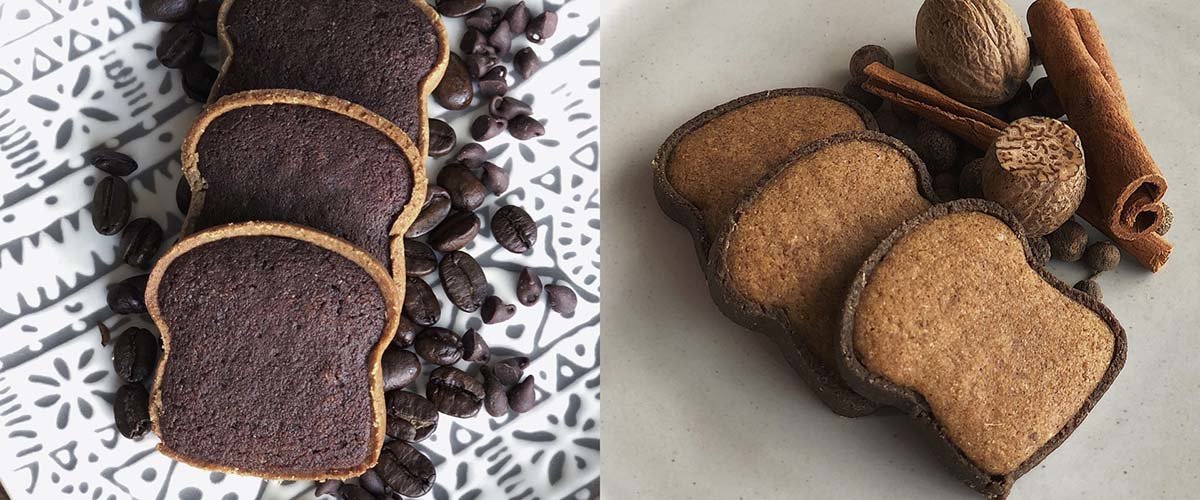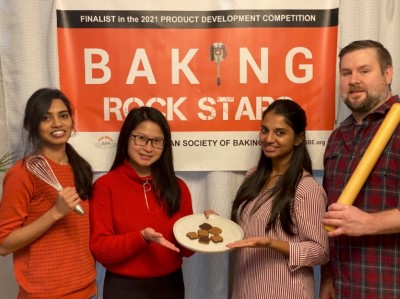
Proposing a “ReToast” to less food waste

Jacqueline Jobin, Environmental Science, Policy and Management, BS '21
Did you know that bread is the most wasted food product? ReToast, an award-winning snack created by University of Minnesota food science and nutrition students Radhika Bharathi, Sonali Raghunath, Steven Cak, and Brigitta Yaputri, is on a mission to tackle this waste. Their collective passion to eliminate food waste led to the development of ReToast, a cookie in the shape of miniature toasts that's made with 30 percent upcycled ingredients from various waste products. ReToast serves as a good source of fiber and can be enjoyed in three different flavors—cinnamon, mocha and pumpkin spice.
The upcycled ingredients used in ReToast are the result of various food waste products, including bread scraps and brewers spent grain, a grain byproduct in the brewing industry. These various wastes are used in the ReToast flour mix which contains 63.6 percent toasted bread scraps flour, 21.6 percent spent grain flour and 14.8 percent spent Kernza® flour. The award-winning snack also comes in reusable and recyclable packaging made from tin and food-grade paper wraps to further reduce waste.
“Inspired by the people and the planet, we are committed to tackling the food waste issue by upcycling byproduct ingredients to create a snack that is better-for-you and for the planet.”
The most innovative ingredient in ReToast is spent Kernza®—also known as intermediate wheatgrass Thinopyrum intermedium—a promising perennial grain crop with the potential to fight climate change. Originally used only for livestock feed, the grain has recently been bred for human consumption. Kernza® provides several environmental benefits because its roots, which can reach up to ten feet, deliver carbon to the soil while simultaneously producing more seed heads than normal wheat. Additional research conducted by the University of Minnesota’s Forever Green Initiative, a partnership between the University and the USDA Research Service that studies Kernza®, shows that the crop diminishes water and soil erosion, decreases nitrate leaching, increases carbon sequestering, and reduces the amounts of energy, tilling and pesticides needed for harvesting.
ReToast team lead Radhika Bharathi currently attends the University as a PhD student in the Department of Food Science and Nutrition. Radhika also works in the Carbohydrate Processing and Cereal Chemistry Lab advised by assistant professor George Annor, PhD, where her research focus includes optimizing targeted processing strategies to improve the functionality and end-use characteristics of Kernza® flour.
When asked what she learned from creating ReToast, Radhika responded, "Team work makes the dream work. None of this could be possible without the support and guidance of so many people who believed in my team's idea and potential. I also learned that it is important to apply technical skills learned in a classroom to solve real-world problems such as food waste and climate change, only then can we move towards making a positive change in society.”
Food waste remains a major issue facing today’s generation; one that will require creative solutions and innovative people. The ReToast team’s innovative use of upcycled ingredients from bread and beer brewing steams enabled ReToast to win first place at the American Society of Baking Product Development Competition, a major sustainability achievement.
Radhika shared, “The theme for this year's product development competition was "sustainability—caring for our future" and when we talk about building sustainable food systems, we have to talk about food waste! About 40 percent of all food produced in the U.S. gets wasted and bread is the most consumed and also the most wasted food, so why not give the bread a second chance? That is why we decided to think of a solution to using this leftover edible bread as an upcycled ingredient. We collected leftover bread scraps from local Twin Cities bakeries and developed our own self-curated quality process to make sure it is safe and ready to be used as a functional, nutritive ingredient for baking. I wanted to make sure that we incorporated Kernza® in our formulation because it fits so well in the theme of using sustainably sourced ingredients to develop ReToast."
The ReToast team is currently having conversations with investors and hopes to commercialize their product in the near future. Learn more about ReToast.
Photo credit: Radhika Bharathi






